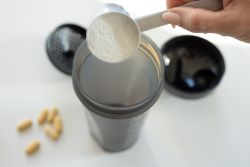Resources
Search >>
Search >>
Ethylene glycol (EG) and diethylene glycol (DEG) are toxic industrial chemicals that have no place in consumer health products. Unfortunately, products ranging from cough syrups to dietary supplements have been found to contain these contaminants, often with tragic consequences.
As the category of sports nutrition matures, so does the science behind it, and few ingredients illustrate that shift better than creatine. Once viewed as a niche performance supplement, creatine has entered the mainstream, driven by a growing body of research, broader consumer education, and innovation in product formats.
In the dietary supplement and ingredient industry, protecting consumer health and meeting regulatory expectations are nonnegotiable. One critical aspect of quality control is residual solvent testing. Residual solvents, volatile chemicals used during manufacturing, can remain in products if not properly removed.
Postbiotics, defined as non-viable microbial cells, their components, or metabolites that confer health benefits to the host, represent a rapidly expanding frontier in microbiome research and functional ingredient development. Watch this webinar for a comprehensive look at the rapidly evolving field of postbiotics, combining cutting-edge science, global regulatory insights, and practical testing methodologies. Originally Aired on December 11, 2025.
In this blog, Dan Brouman traces MAHA’s path since December 2024, when the MAHA Caucus launched in Congress. Brouman also discusses MAHA’s future and its effects on food policy.
Selecting the right microbiological testing method isn’t just about speed or cost. It’s about risk management, product integrity, and regulatory compliance. Click to read about the strengths and limitations of different methodologies essential to avoid false negatives, regulatory citations, or costly recalls.
In the world of dietary supplements and food testing, unexpected results like failed specifications, out-of-spec (OOS) results, or surprising contaminant detections can be unsettling, but they’re not uncommon. Here’s how to navigate the process when results don’t align with expectations.
When it comes to dietary supplement testing, one seemingly small detail can have outsized consequences: specifying the correct vitamin form. Understanding and communicating the exact vitamin form in your product is not just a technical necessity, it’s a strategic imperative in ensuring accurate results, timely reporting, and regulatory compliance.
A supplement manufacturer added methylcobalamin (Vitamin B12) to a product, expecting to meet label claims. However, testing revealed only ~50% of the claimed amount, triggering an out-of-spec (OOS) result. Read to learn how Eurofins Supplement Testing resolved the unexpected results.
Switching oil sources, or developing a new product with an alternative oil, requires more than a label change. It demands a holistic view of how the oil behaves in your product, how it interacts with other ingredients, and how it holds up over time. Click to learn about the key considerations.
















